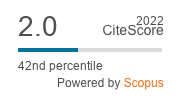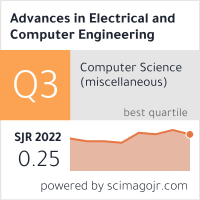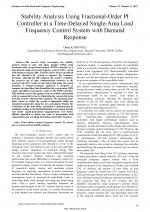| 2/2023 - 5 |
Stability Analysis Using Fractional-Order PI Controller in a Time-Delayed Single-Area Load Frequency Control System with Demand ResponseKATIPOGLU, D. |
| View the paper record and citations in |
| Click to see author's profile in |
| Download PDF |
Author keywords
delay systems, frequency control, PI control, power system control, stability analysis
References keywords
control(25), systems(19), frequency(16), power(15), load(13), stability(12), time(11), response(11), demand(11), delay(11)
Blue keywords are present in both the references section and the paper title.
About this article
Date of Publication: 2023-05-31
Volume 23, Issue 2, Year 2023, On page(s): 39 - 46
ISSN: 1582-7445, e-ISSN: 1844-7600
Digital Object Identifier: 10.4316/AECE.2023.02005
Web of Science Accession Number: 001009953400005
SCOPUS ID: 85164347676
Abstract
The current study investigates the stability analysis based on gain and phase margin (GPM) using fractional-order proportional-integral (FOPI) controller in a time-delayed single-area load frequency control (LFC) system with demand response (DR). The DR control loop is introduced into the classical LFC system to improve the frequency deviation. Although the DR enhances the systems reliability, the excessive use of open communication networks in the control of the LFC results in time delays that make the system unstable. A frequency-domain approach is proposed to compute the time delay that destabilizes the system using GPM values and different parameter values of the FOPI controller. This method converts the equation into an ordinary polynomial with no exponential terms by eliminating the exponential terms from the systems characteristic equation. The maximum time-delay values at which the system is marginally stable are calculated analytically using the new polynomial. Finally, the verification of the time delays calculated is demonstrated by simulation studies in the Matlab/Simulink environment and the root finder (quasi-polynomial mapping-based root finder, QPmR) algorithm to define the roots of polynomials with exponential terms providing information about their locations. |
| References | | | Cited By |
Web of Science® Times Cited: 0
View record in Web of Science® [View]
View Related Records® [View]
Updated 4 days, 3 hours ago
SCOPUS® Times Cited: 0
View record in SCOPUS® [Free preview]
There are no citing papers in the CrossRef Cited-by Linking system.
Disclaimer: All information displayed above was retrieved by using remote connections to respective databases. For the best user experience, we update all data by using background processes, and use caches in order to reduce the load on the servers we retrieve the information from. As we have no control on the availability of the database servers and sometimes the Internet connectivity may be affected, we do not guarantee the information is correct or complete. For the most accurate data, please always consult the database sites directly. Some external links require authentication or an institutional subscription.
Web of Science® is a registered trademark of Clarivate Analytics, Scopus® is a registered trademark of Elsevier B.V., other product names, company names, brand names, trademarks and logos are the property of their respective owners.
Faculty of Electrical Engineering and Computer Science
Stefan cel Mare University of Suceava, Romania
All rights reserved: Advances in Electrical and Computer Engineering is a registered trademark of the Stefan cel Mare University of Suceava. No part of this publication may be reproduced, stored in a retrieval system, photocopied, recorded or archived, without the written permission from the Editor. When authors submit their papers for publication, they agree that the copyright for their article be transferred to the Faculty of Electrical Engineering and Computer Science, Stefan cel Mare University of Suceava, Romania, if and only if the articles are accepted for publication. The copyright covers the exclusive rights to reproduce and distribute the article, including reprints and translations.
Permission for other use: The copyright owner's consent does not extend to copying for general distribution, for promotion, for creating new works, or for resale. Specific written permission must be obtained from the Editor for such copying. Direct linking to files hosted on this website is strictly prohibited.
Disclaimer: Whilst every effort is made by the publishers and editorial board to see that no inaccurate or misleading data, opinions or statements appear in this journal, they wish to make it clear that all information and opinions formulated in the articles, as well as linguistic accuracy, are the sole responsibility of the author.





